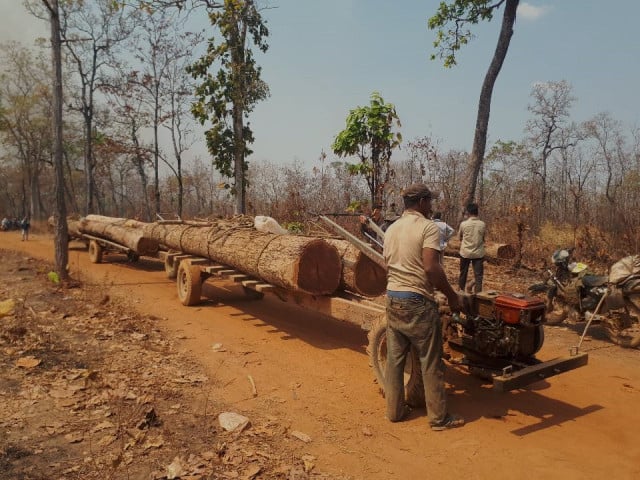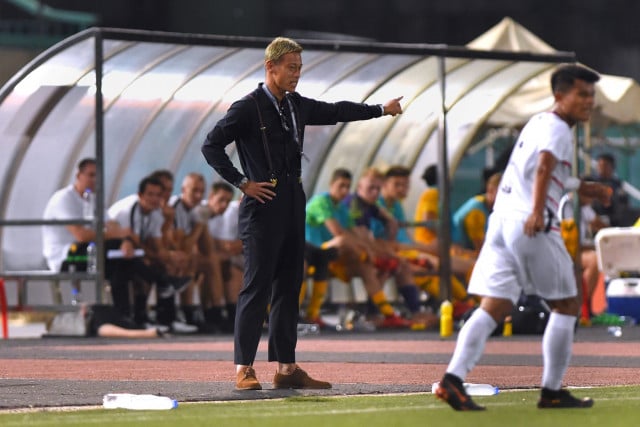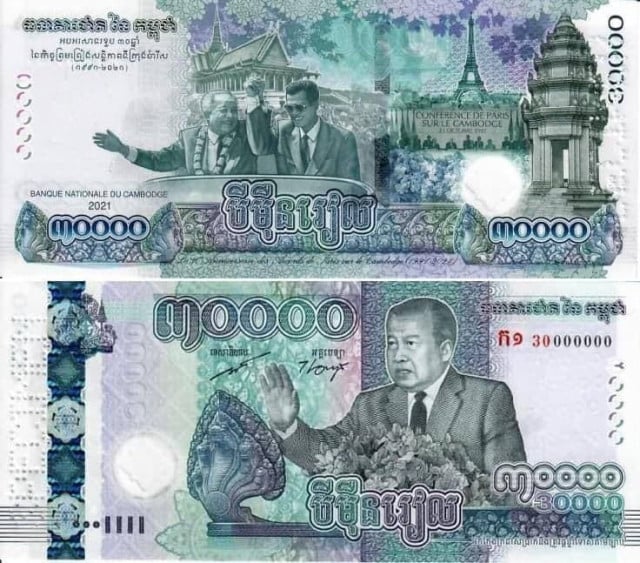Failing Conservation Efforts in Prey Lang Once Again Focus of Scrutiny

- Gerald Flynn and Phoung Vantha
- March 29, 2021 3:18 AM
The Prey Lang Community Network criticized USAID’s conservation work and a report from Global Initiative suggests damage done by illegal logging in Prey Lang will take decades or centuries to reverse.
PHNOM PENH--In an open letter published March 22, the Prey Lang Community Network (PLCN) wrote that they were “appalled” by recent statements from USAID that suggested the US development agency has been working directly with the PLCN to conserve Prey Lang Wildlife Sanctuary.
“We, the PLCN, were appalled to see that USAID in a recent statement claims to ‘work directly with the PLCN.’ We have never seen USAID coming to talk to us. USAID never informed us about the purpose of their Greening Prey Lang project,” the letter read.
Estimated to have some 400 active members spread across Kratie, Stung Treng, Kampong Thom and Preah Vihear provinces, the PLCN have long patrolled and protected Prey Lang Wildlife Sanctuary—one of the largest old-growth forests in all of Southeast Asia.
The continued threat of logging prompted the government to grant Prey Lang “protected area” status in 2016, a move that was supposed to preserve the conservation site that officially spans 431,683 hectares. Satellite imagery and data gathered by the PLCN has shown that quite the opposite has happened, with 2016 ranking as one of the worst years on record for illegal logging in Prey Lang.
The PLCN’s consistent efforts to expose illegal logging activity and the connections they have been able to make to powerful tycoons with government connections has put them at odds with the Ministry of Environment and then subsequently USAID.
“USAID has never asked us if we agree to what they are doing on our ancestral forest lands. We have never received any financial or technical support from USAID,” the PLCN wrote.
Officially launched in April 2019, the USAID-Ministry of Environment joint project Greening Prey Lang is set to run for five years with a budget of $21 million—a sum that aimed to improve the governance of natural resources in Prey Lang.
Prey Lang Continues to Disappear, Despite Conservation Efforts
However, nearly two years in and deforestation remains rampant in Prey Lang, a report published by the PLCN and researchers from the University of Copenhagen suggested.
The report, published on Feb. 27, analyzed data from June 2019 to June 2020 and found that during this period Prey Lang lost 7,570 hectares of forest cover.
“Forest loss in 2019 was only superseded by the monumental forest destruction of 2016,” the report stated, adding that the rate of deforestation saw CO2 emissions from Prey Lang increase 73 percent between 2018 and 2019.
The 14-page report detailed corruption, nepotism and a crackdown on the PLCN’s ability to patrol the forests, who reported that chainsaws confiscated from illegal loggers had been handed over the Ministry of Environment, only to be redistributed to loggers once more.
It also lamented the Ministry of Environment’s decision to ban the PLCN from patrolling Prey Lang in February 2020, arguing that this move directly led to a significant increase in logging activity. The same month, prominent environmentalist Ouch Leng, along with four other activists, were detained, sent to court and eventually released without charge for attempting to enter Prey Lang’s core area.
“We have faced threats from loggers that we would not see our families again, as well as threats of violence and arrest by the authorities. We have experienced accidents, violent attacks and even death,” the PLCN wrote in their letter to USAID, adding that the Ministry of Environment was behind the threats.
“In all of this, USAID never supported us or defended our rights,” they wrote.
US Concerns Not Translating into Action
The PLCN’s letter came in response to a March 8 statement from the US Embassy which outlined deep concerns over the ongoing deforestation taking place within the protected area and called for more action from the Cambodian government to address the blight of illegal logging.
The US Embassy also stated that “We continue to work directly with the PLCN and the MOE [Ministry of Environment] to support a dialogue so that they can work together on the shared goal of protecting Prey Lang.”
It was this claim that “appalled” the PLCN, who hit back saying that USAID had declined to meet with PLCN’s standing committee on the grounds that the Greening Prey Lang project office can only house two PLCN members at a time.
“This is not how we work. We work as a network, and not as individuals, whom you can buy or intimidate,” the PLCN wrote, adding that their requests to join USAID-led projects as a stakeholder were also denied.
The PLCN went on to denounce USAID, stating that joint patrols between the PLCN and Ministry of Environment rangers do not happen as USAID suggested. Instead, the PLCN wrote, USAID has paid individual ex-members of the PLCN to collaborate with the government in Prey Lang.
“Therefore, our question to USAID is: why does USAID claim to work directly with PLCN?” the letter concluded. “If USAID does not wish to work with local and indigenous peoples, it is your decision. But please respect our network. Do not misuse our name, PLCN, for your own benefit. The statement by USAID is not acceptable to PLCN and we ask you to change it to reflect the facts.”
While the PLCN invited USAID to meet with them in Prey Lang for genuine collaboration, the US Embassy responded to reporters’ enquiries with a reiteration of concern.
“The United States is deeply concerned about continued deforestation in Cambodia’s protected areas, as emphasized most recently in the US Embassy’s statement of March 8, 2021,” the US Embassy stated.
They went on to say that USAID has engaged with community organizations and encourages future productive dialogue.
“It is the hope of the US government that the community network, the Ministry of Environment, and other stakeholders will work together on the shared goal of protecting Prey Lang. USAID stands ready to help facilitate that dialogue,” the US Embassy said.
USAID Collaborating with “Crooks”
But for those who have been engaged with Prey Lang for longer than USAID, the impact of the US-run projects within the protected area have done little to stem the tide of logging and have only further legitimized the Ministry of Environment’s crackdown on the PLCN.
“The USAID projects, both the Supporting Forests for Biodiversity and Greening Prey Lang [projects] have been instrumental in excluding PLCN from forest activities,” said Courtney Work, an assistant professor working in the Department of Ethnology at the National Chengchi University in Taipei, Taiwan.
Work, who began her research in Cambodia in 2009, recently presented a webinar through the Center for Khmer Studies where she explored the concept of ecocide in relation to the exploitation of natural resources, including Prey Lang, throughout Cambodia.
“It's not like USAID makes the decision to exclude, but they go along with what the Ministry of Environment wants to do and pay for all the programs,” Work wrote in an email. “So, it's possible that if there were no USAID project, the Ministry of Environment would have no community-based activities to legitimize themselves.”
She went on to note that USAID’s tactics have caused tension—perhaps intentionally—by setting up alternative community patrols and protected area management groups under the Ministry of Environment. This, she warned, gives the Ministry of Environment legitimacy even in the face of blatant complicity in the illegal logging operations that are decimating Prey Lang.
However, Work noted that the Ministry of Environment would likely not be able to fund its own operations in Prey Lang without USAID—particularly given the budget cuts to all government agencies, save police and the armed forces, introduced in the wake of the COVID-19 pandemic.
“There's no question that the government is lying and cheating, and [that] USAID knows this,” Work wrote. “Honestly, the situation here makes so clear how broken this system is. Development actors should not be funding this fiasco.
“In many ways, development actors created this mess, certainly with the collaboration of a bunch of crooks, but this turns them all into crooks. USAID could have refused to fund the Ministry of Environment’s destructive forest management policies. Instead they funded it, staffed it, and made a bunch of beautiful propaganda to advertise the cover up,” she added.
The “propaganda” Work referred to is USAID’s Greening Prey Lang Exposure series—a platform supposed to highlight successful fruits born by the project—but one that Work argued is at odds with the reality of state-sponsored illegal logging operations.
“Hard to know if they'll [USAID] pull out. I don't think the amount of destruction in Prey Lang will change at all if USAID pulls out. They are already logging at full capacity in Prey Lang, with hundreds of local people employed, and in-migration continues unchanged and informal,” said Work.
Cambodia’s Failed Conservation Efforts Met with More International Scrutiny
However, the failure to protect Prey Lang was highlighted in sharp detail by the Global Initiative Against Transnational Organized Crime—a Geneva-based civil society organization—which published a 43-page report on the criminal operations that have contributed to large-scale deforestation in Cambodia.
Using Global Forest Watch’s data, the report estimated that some 557,000 hectares of tree cover has been lost in Cambodia’s protected area between 2001 and 2018, representing a loss of 11.8 percent of all protected areas in Cambodia.
The key driving force of deforestation in Cambodia, the report said, is the large-scale conversion of forests for the production of commodities.
“This practice has been facilitated through government-sanctioned territorial concessions—variously known as economic land concessions (ELCs), social land concessions (SLCs) and (ironically) forest-restoration projects—which are granted to domestic and foreign investors for the purpose of ‘national development, creating employment in rural areas and restoring ‘non-use’ land,” the report read.
It noted that, in 2013, ELCs—the issuance of which was halted by Prime Minister Hun Sen in 2012—were often granted in protected areas, with 14 percent of all Cambodian protected areas overlapping with an ELC.
One prominent company operating on a forest-restoration concession within Prey Lang is Think Biotech, who share ownership with Angkor Plywood and Thy Nga Development. Together, all three companies operate what activists have dubbed “a monopoly” on logging in Prey Lang.
Global Initiative Against Transnational Organized Crime reported that Think Biotech, in conjunction with Angkor Plywood, have extracted resources from within and beyond their designated concession zone and have been found to have logged protected species.
“Between 2013 and end of 2019, Think Biotech is estimated to have generated revenues amounting to $406 million,” the report stated, also noting the intensified logging that took place following the Ministry of Environment’s ban on PLCN patrols.
Think Biotech, Angkor Plywood and Thy Nga did not respond to requests for comment.
The report details case studies surrounding Prey Lang, but a consistent theme throughout is that the regulations and laws put in place by the government have done nothing to prevent or even slow the pace of illegal logging.
It added that numerous government ministries appear to be contravening their own laws to better profit well-connected companies at the expense of the environment.
“Reversing this damage will take decades, even centuries, before extensive and established forest habitats are restored,” the report concluded. “By creating conditions that may allow private companies to engage in illegal logging in protected areas under the guise of developing ELCs, the government of Cambodia is, at a minimum, allowing the possibility for organized crime to embed.”















